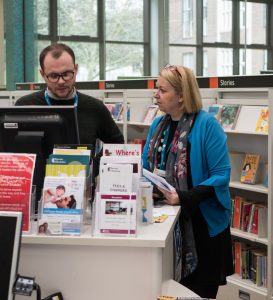New Gender Pay Gap Reporting Regulations come into effect on the 4th April, which means that all British organisations with over 250 employees must disclose information about pay differentials between men and women in their employment. But what does this mean for library services? The Chief Executives of four English library mutuals met on 20th March to discuss the implications of this initiative for their organisations and the wider library sector, and to explore how they might shape discussion within and beyond their organisations on improving pay equality in a profession with high proportions of female and part-time workers.

Three of these organisations – Libraries Unlimited, Suffolk Libraries and Inspire: Culture, Learning and Libraries – have published their gender pay gap data this year – relating to the mean and median averages for men and women for pay and bonuses, the proportion of women and men receiving bonuses, and the proportion of men and women occupying each quartile of the service pay structure. For these leaders, this represents not only a learning experience, but an opportunity to lead the sector by offering new insights into how libraries might actively advocate for women’s career progression and increased diversity across the library workforce.
Peter Gaw, Chief Executive of Inspire, said “We welcome the opportunity to talk about the gender pay gap, and to start to explore and address some of the reasons why it exists. In libraries and other cultural services, staff are our main asset. Investing and supporting all to reach their potential is important for us as an employer as well as benefiting our communities.”
A better understanding of how gender pay impacts an organisation can help leaders identify new strategies and techniques that can support and develop women across the sector – meaning that organisations like Explore York, which have fewer than the 250 employee threshold for disclosure, are also keen to explore the implications for their own current and future practice.
Fiona Williams, Chief Executive of Explore York, said “Though we don’t have to report our gender pay, we’re keen to learn from our colleagues in the other library mutuals, who are all reporting their pay differential this time. We will be looking further at our own data in the coming months to better understand our gender pay profile.”

Nick Poole, Chief Executive of CILIP, the Chartered Institute for Library and Information Professionals said “CILIP welcomes and applauds this initiative from Libraries Unlimited, Suffolk Libraries and Inspire: Culture, Learning and Libraries to publish data about gender and pay in their organisations openly and transparently. The 2015 CILIP/ARA Workforce Mapping found evidence of a significant gender pay gap in the library and information profession. We are committed to doing everything we can to change this picture through targeted action, as set out in the CILIP Equality and Diversity Action Plan. It is particularly valuable to see how smaller organisations that are below the threshold for disclosure can still demonstrate best practice in making this information available. We hope that organisations across the sector will follow suit, and we will look to do the same with our own data as the professional association for the library and information sector.”
The meeting prompted these four organisations, who are collaborating through a public service mutuals partnership, to identify some key ways that libraries could address their gender pay gaps.
- Explore your data
An Arts Council England funded project called #UnlimitedValue is helping Libraries Unlimited examine their data and use this to drive change in their organisation. This has led to a willingness to explore data on staff in greater detail than is required by the new regulations on gender pay gaps. For example, finding out how the differentials vary across different regions, libraries, or service subsets might offer greater insights on the areas of the organisation that could be usefully targeted to improve.
Ciara Eastell, Chief Executive of Libraries Unlimited said “The Unlimited Value research is enabling us to gain greater insight into all aspects of our data, including workforce data. We are keen to develop a much more diverse workforce and we’ll be using the gender pay data, along with the Arts Council’s Creative Case for Diversity, to drive forward our commitment to a greater range of opportunities for everyone in our organisation to progress and develop their careers with us.”
- Look at your recruitment
Reviewing recent recruitment processes, from advert to selection, could offer additional insights in how organisations can make quick changes to address the gender pay gap. Research indicates that unconscious bias is present in job advertisements which might make them more appealing to men, or might cause women to ‘count themselves out’ before they even apply. Posts which deliberately emphasise the service’s values, or clarify flexible working policies might also encourage those with additional domestic responsibilities (according to research, predominantly women) to send in their applications.
For all four organisations, being a public service mutual can offer more freedom to innovate and develop a more flexible approach to the recruitment and selection process. This opens up opportunities to broaden the suite of selection tools. Incorporating a shadowing experience as well as an interview, for example, could encourage a more diverse range of candidates to explore what library work is all about.
Bruce Leeke, Chief Executive of Suffolk Libraries said “We believe it’s important for organisations like ours to transparently discuss and understand our gender pay gap. Suffolk Libraries is fully committed to increasing our diversity as an employer and ensuring that our employment opportunities appeal to a broad range of people by offering fair pay and rewards. Our policies are always being reviewed to ensure flexibility, maximise staff engagement and support smarter working.”
- Embed development opportunities throughout your processes
All four library mutuals agreed on the need to provide enhanced development opportunities that enable a more diverse range of staff to transition towards leadership roles. This might include providing opportunities for frontline staff to experience life in other areas of the organisation; hosting staff development days where employees have a chance to learn from one another and share good practice, or mentoring programmes which help managers identify and develop ‘talent’ amongst their workforce. In some organisations, reverse mentoring programmes (where lower-level staff mentor senior leaders) are shown to have an impact on gender differentials at work.
At Libraries Unlimited, a recent staff development programme enabled library supervisors to regularly connect and share their ideas for service improvements through an action learning set. This has resulted in a greater sense ofconnectedness to the organisation as a whole and Libraries Unlimited are now looking at ways of implementing similar programmes for staff at other levels of the organisation.
- Be open and transparent
What if the stats don’t look perfect? The most fundamental aspect, according to Peter Gaw, is the desire to learn from the experience of library services with gender pay gaps in order to launch an open and transparent discussion in support of sectoral change.
“Library services are in some ways particularly vulnerable to gender pay differentials” says Peter. “We have a predominantly female workforce, many of whom work part time. The new regulations have given us a chance to engage openly on this issue and to generate discussion at different levels of Inspire and the sector as a whole. We are hopeful that new initiatives to support women at different parts of the pay structure, and to ensure an inclusive working environment for all, will emerge from these conversations.”
To see the gender pay data for the three organisations, visit:
Inspire https://www.inspireculture.org.uk/about-us/gender-pay-gap-reporting/
Suffolk Libraries https://www.suffolklibraries.co.uk/about/gender-pay-gap/
Libraries Unlimited https://librariesunlimited.org.uk/news/libraries-unlimited-gender-pay-gap-as-at-5th-april-2017/
